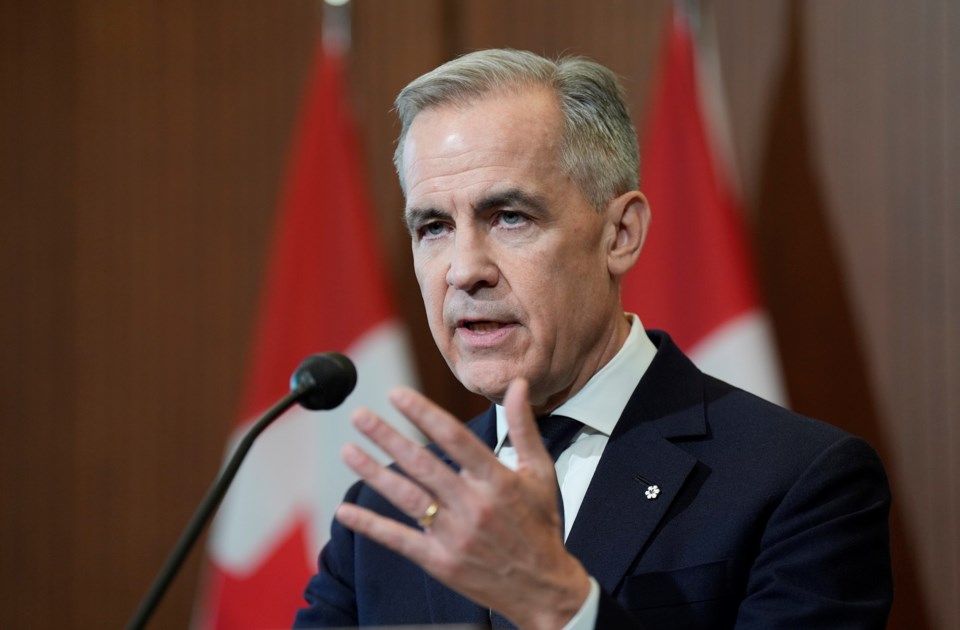Canadian leaders say that the country has gotten the best of a bad deal in U.S. President Donald Trump's global trade war so far — but that's not good enough.
Prime Minister Mark Carney chaired a virtual meeting with premiers Thursday after Trump announced late Wednesday that Canada and Mexico would be spared from a blanket 10 per cent "reciprocal" tariff on most imports coming into the U.S. However, while Carney said Canada may have gotten “the best deal of a series of tough deals,” he also noted that other levies on steel, aluminum, and the auto industry remain in place, prompting him to respond “with force.”
Carney, who is also running for election as the Liberal leader, announced what he called a "calibrated" response to the latest trade aggression, setting the stage for a relationship he argued must be “redefined.”
Ottawa will mirror the U.S., placing a 25 per cent levy on all vehicles coming into Canada from the U.S. that do not meet Canada-United States-Mexico Agreement (CUSMA) rules, with the measure also applying to non-Canadian content that meets its requirements. Canadian tariffs will not impact imports from Mexico nor auto parts from the U.S., he explained, in recognition of the “benefits of our integrated production system.”
Every dollar raised from the counter-tariffs, which he estimated could total $8 billion before remission processing, will go directly to autoworkers and impacted companies, said Carney. That process allows businesses to request relief from measures making up Canada’s retaliatory action.
The fallout of Trump’s tariff on foreign vehicles was swift, with Stellantis confirming it’s cancelling production at its Windsor plant for two weeks. Workers were told not to come in unless directed otherwise by their supervisor, according to a notice from the company shared by the union.
Carney expressed solidarity with those reeling from the closure, promising not to “sugarcoat” the damage that Trump’s tariffs will do to the Canadian economy and warning that tough times are ahead.
Pressed on whether that means a recession is in the offing, he said the U.S. is starting to see its financial conditions “tighten,” and it’s typically the case that Canada has a hard time avoiding “something similar.”
Carney also warned that Trump’s escalating actions and lingering threats in other sectors mean that there is a “need to have a renegotiation and reaffirmation of which elements of the commercial relationship stand.” This could include matters related to security and defence partnerships.
It’s unclear if this renegotiation falls within CUSMA or is separate.
“We need to reset the overall relationship, set the boundaries around that and where we're going to work together,” he said.
“I can’t pre-wire all those discussions, but what I know is that trying to have a discussion — given the scale of ambition of the U.S., given all the measures they've taken not just against Canada but against the whole world — that we are not going to make progress if we try to focus only on one issue.”
Carney said those in-depth talks will not take place until after the April 28 election — and will be held by whoever the prime minister is at that time. He doesn’t have another phone call with Trump scheduled, but may speak with the president again before voting day.
On Thursday, Conservative Leader Pierre Poilievre pitched nixing the GST on Canadian-made cars, predicting it would save people $2,500 on vehicles costing $50,000. He also urged premiers to follow suit on their portion of provincial taxes.
Poilievre plugged his “economically affordable” proposal for a temporary loan program to ensure employees keep working through the trade spat, telling reporters in Kingston this would “start with a fund of $3 billion.” He added that, given they would be loans, they would not count as “expenditures” in Ottawa’s books.
Poilievre reiterated that if elected into office, he would demand he and Trump “rapidly renegotiate" CUSMA “on a very tight timeline,” during which time he would recommend suspending tariffs.
For his part, NDP Leader Jagmeet Singh didn't give Carney any credit for Canada being excluded from Trump’s reciprocal tariffs.
“I don't think there's anything that Mark Carney did specifically to result in that,” Singh said.
At Queen's Park, Ontario Premier Doug said the premiers at the first ministers' meeting agreed with Carney's assessment of the situation: "We got the best of a bad deal, which, in my opinion, is still totally unacceptable," he said.
"The only thing that's acceptable is zero tariffs."
Ford credited the relationships Canadian leaders have built in the U.S. for securing the exemption to Trump's "reciprocal" tariffs, and said Canada should continue to fight back with retaliatory tariffs, and negotiate "from a position of strength, not weakness."
Meanwhile, Ontario Liberal finance critic Stephanie Bowman said the province should focus on procurement, and suggested the government buy made-in-Ontario vehicles for all government agencies and municipalities.
Ontario NDP Leader Marit Stiles said her thoughts are with the autoworkers in Windsor because of the economic impact of Trump's tariffs.
"We are seeing it here in Ontario, and American workers and their families are going to see it as well," she said.
—With files from Charlie Pinkerton




